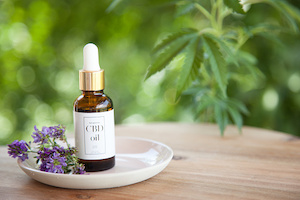You’ve likely seen the signs at grocery stores, big-box retailers and even specialty retailers. Nearly every retail establishment you enter has signs proclaiming they now sell CBD oil. Cannabidiol has quickly become one of the biggest wellness trends. The compound can be found in anything from soaps to lotions and oils and even at your favorite smoothie bar.
Proponents of CBD oil claim the supplement helps with everything from anxiety to chronic pain to inflammation, stress and more. But does it really work? And should you use it? Let’s explore below.
What is CBD?CBD is an active compound from the hemp plant from which marijuana grows. While CBD comes from a hemp plant and can be a component of medical marijuana, it does not produce the high that is associated with marijuana. The World Health Organization (WHO) reports: “In humans, CBD exhibits no effects indicative of any abuse or dependence potential.”
CBD can contain low levels of THC — the psychoactive compound in marijuana — if a hemp plant pollinates with a cannabis plant.
Is CBD Legal?
That depends. Federally, the purchase of CBD is legal as long as it doesn’t contain more than 0.3% THC. The U.S. Food and Drug Administration (FDA) has prohibited the sale of CBD in products that claim health benefits. However, states can set their own laws on the sale and consumption of CBD. In Ohio, the sale and use of CBD and hemp is legal.
What Does CBD Treat?
Scientific studies have found that CBD oil is effective in treating various forms of epilepsy. In fact, last year the FDA approved a drug consisting of cannabidiol to treat seizures associated with two rare and severe forms of epilepsy.
Studies have also shown CBD oil’s benefits in helping people fall and stay asleep. It has helped with the treatment of chronic pain and inflammation from conditions like arthritis, and according to WHO, “There is also preliminary evidence that CBD may be a useful treatment for a number of other medical conditions.”
Should I Use CBD?
While CBD oil seems like an attractive solution to resolving an array of issues, it’s important to remember that like other dietary supplements, the production of CBD is not regulated by the FDA. You could be getting a stronger dosage than you need or possibly something that’s not CBD at all.
Keep in mind that because there is a lack of high-quality evidence in human studies, it’s difficult for health professionals to pinpoint an effective dosage for each condition it may treat.
What about side effects?
The WHO reports that pure CBD is generally well tolerated, has a good safety profile and any adverse effects were likely the result of interactions with a patient’s current drug regimen. “To date, there is no evidence of recreational use of CBD or any public health-related problems associated with the use of pure CBD,” the WHO notes. If you’re interested in adding CBD to your diet, speak to your doctor to ensure the supplement won’t interact with any drugs you’re taking or negatively impact any current conditions.











